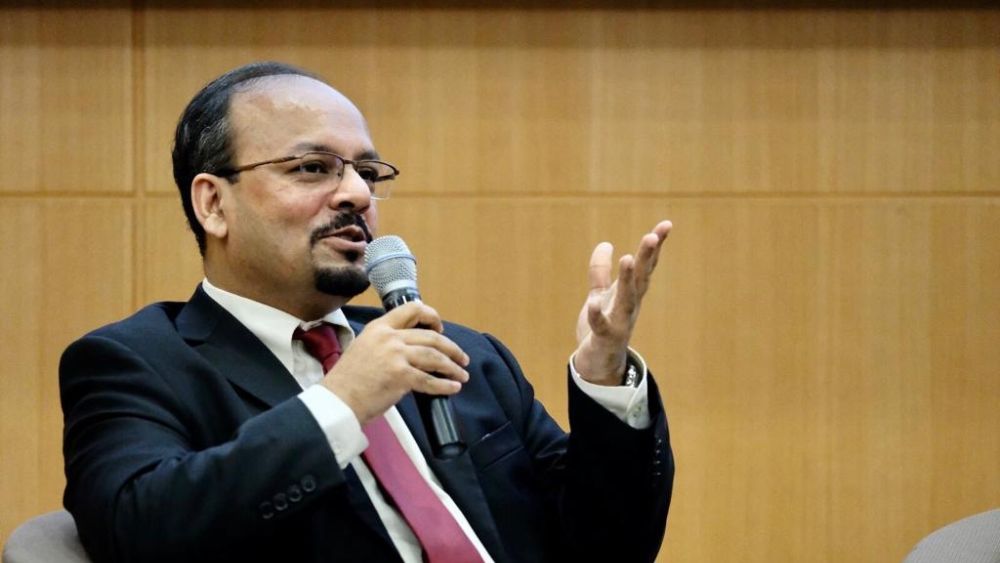
5 Reasons to Start Financial Literacy Young
Financial literacy is an important skill set that must be developed at a young age to ensure better financial well-being in adulthood. Aurobindo Ghosh, SMU Assistant Professor of Finance, explains why it is especially critical for young adults to have these skills in the era of digital finance, and shares the 5 key areas they should focus on to help them achieve financial fitness.
The recent GameStop stock market frenzy, which made huge waves in the world of investing, drove home the importance of financial literacy among young adults. As anyone who has been following the news might already know, the stock for the video game retailer explosively surged earlier this year when a plan by a group of Reddit users to push up the GameStop stock price went viral.
With the deluge of information available online, it would seem tech-savvy youths have more access to financial education than ever before. However, it was found during a 2018 study that nearly a third of young adults were “financially precarious” due to poor financial literacy and lacked money management skills and income stability.
More worryingly, social media platforms and forums such as the WallStreetBets Reddit thread have also fuelled aggressive and rash financial moves, which may result in novice investors dabbling in risky punts in a volatile economic climate.

Besides meme stocks and investment strategies, the Gen Z set is empowered by a multitude of digital tools for managing their money. But newfangled fintech instruments have to be supported by sound financial knowledge — an area that might be lacking among younger people. According to this survey by the American Psychological Association, four out of five Gen Z consumers say money matters are a leading source of stress. Tellingly, more than three in 10 respondents list personal debt as another major source of stress.
As such, financial literacy is a critical life skill essential not only for the next Warren Buffett, but every responsible young adult. Here are five key areas to develop financial fitness from a young age, according to Aurobindo Ghosh, SMU Assistant Professor of Finance and Programme Director of Citi Foundation-SMU Financial Literacy Program for Young Adults (CFS FinLit).
1. Never too young to learn about money
Financial literacy is a life skill, explains Asst Prof Ghosh, who spearheads the CFS FinLit Programme, to equip young adults with finance skills to manage their money, accumulate cash and gain a solid head start in life.
“Financial literacy is a good habit like good hygiene,” elaborates the professor.
“Just as how good hygiene helps you maintain your physical and mental well-being, financial literacy is the first step of financial wellness. So the first time you learn about managing your money should be as early as late secondary school, and in early tertiary education you should learn about financial literacy.”
But rather than attempt to pick up financial know-hows through crash courses on investing, or by trying to acquire knowledge in bursts of research, Asst Prof Ghosh shares that financial literacy is best acquired in layers, much like the layers of clothing one wears in a cold climate.
“First, it starts with understanding needs and wants, followed by budgeting, keeping track of your expenses, living within your means, and saving regularly—in particular, for a rainy day or for emergency funds which will give some insurance and financial stability,” explains Asst Prof Ghosh.
“Once the essential layers are put in place, then you look for investment for passive income or growing your wealth, followed by understanding debt.”
2. Easy money, astronomical risks
Before the GameStop phenomenon, tech unicorn startup Robinhood came into existence in 2013 with an explicit aim of democratising finance. The stock trading app aimed to make trading more accessible to everyone and not just a select few, by making trades brokerage commission-free.
“However, the saying ‘if you do not pay for the product you are the product’ might be true here,” says Asst Prof Ghosh.
While Robinhood was ostensibly enabling tech-savvy or tech-aware younger people to trade with tips from resources like the Reddit Wallstreetbets forum, Robinhood’s revenue flow came from their primary broker through “volume of order flow”—a percentage of the volume that was being generated by trades from new investors.
According to Asst Prof Ghosh, some new investors were possibly unaware that GameStop itself was a brick-and-mortar video game retailer, struggling in a time when most consumers were buying games online. As such, GameStop had eight quarters of negative earnings, which translates into “a business in quite bad shape and low prospects of high stock valuation”. Meanwhile, in January 2020, the GameStop shares saw a meteoric rise by over 2,500 per cent, but came crashing down by nearly 90 per cent to $48.
“The part that was possibly missing in the enthusiastic newbie traders was the financial knowledge that stocks are priced based on prospects of the company,” cautions Asst Prof Ghosh.
“It is imperative to know what they are potentially buying is an asset with an intrinsic value, and not making a move that is highly speculative at best and a pure gamble at worst.”
3. Financial education the right way

“Embark on learning sessions on financial planning and financial literacy including gamified content similar to the Citi Foundation-SMU Program,”
Aurobindo Ghosh
SMU Assistant Professor of Finance and Programme Director of Citi Foundation-SMU Financial Literacy Program for Young Adults (CFS FinLit)
While scrolling through hot stock picks and lively debates on online investment forums might be a fun way to spend a weekday evening, traditional learning tools like books or in-class learning might work better for familiarising oneself with fundamental financial concepts. However, financial literacy is a life skill, and relying on basic concepts may not be sufficient for long-term financial health.
Asst Prof Ghosh compares financial literacy to riding a bicycle: Just like how one might pick up theoretical knowledge about cycling and how bicycles work, but would not be able to actually cycle without practice, theory alone might not help much when it comes to financial literacy. Instead, it is helpful to practise good habits like determining personal needs and wants, budgeting, saving and a suitable insurance plan.
“Thereafter, embark on learning sessions on financial planning and financial literacy including gamified content similar to the Citi Foundation-SMU Program,” suggests Asst Prof Ghosh.
“The most reliable sources, I would say, are those that are maintained by government agencies like MoneySense, CPF Board and HDB, besides resources provided by autonomous universities and other widely respected and credible blogs that are not sponsored or advertising financial products.”
4. A fresh approach to managing dollars and cents
What works for others might not work for you when it comes to building a personal financial strategy. This is especially the case for those blindly trying to adopt the practices of older generations, without assessing one’s own objectives and mindset.
“While older generations like the baby boomers or Gen X were quite conservative in their approach and risk-taking, with millennials being also relatively circumspective, Generation Z is more assertive in making their financial decisions,” observes Asst Prof Ghosh.
Such tendencies come with their own set of pros and cons: Gen Zs, for example, grew up as children of the digital revolution and are keener to adopt technology in all shapes and forms, including in finance. They are more likely to adopt a cashless payment system and a non-traditional digital online-only bank.
“However, this tech-driven financial behaviour, if unhinged, might see examples like GameStop or buying into cryptocurrencies like BitCoins,” says Asst Prof Ghosh.
“Millennials have also wholeheartedly adopted the digital space like social media and are not as reticent to using online financial services as previous generations. So there needs to be a balance that sound financial literacy knowledge will impart.”
5. Biggest financial misconceptions

“Budgeting and saving is a habit, and the earlier you start, the earlier you form a habit.”
Aurobindo Ghosh
SMU Assistant Professor of Finance and Programme Director of Citi Foundation-SMU Financial Literacy Program for Young Adults (CFS FinLit)
Money myths are rife across any age demographic, be it an early retirement tip based on the abstinence of avocado on toasts or Starbucks coffees, or a multitude of get-rich-quick schemes. One other key misconception observed by Asst Prof Ghosh is that there is no point in saving as our income or allowance is too meagre.
“Budgeting and saving is a habit, and the earlier you start, the earlier you form a habit,” he explains.
The second misconception he has noticed is how one needs to accumulate a significant deposit for maintaining a savings account. At most local banks and upcoming digital banks, however, the cost of maintaining a minimum balance is now accessible to most. Finally, another commonly held misconception is that one needs to be rich to invest. Asst Prof Ghosh points out alternatives for smaller investors such as emerging micro-investment options, particularly within robo-advisories and other digital spaces within traditional banks.
“Investing is somewhat like riding a bicycle, it’s hard to learn it unless you have had a few falls,” advises Asst Prof Ghosh.
“The earlier you have the falls, the earlier you learn. The best part is young people, who typically recover from falls better, have a longer runway to achieve their financial targets in life, given that they start early.”




